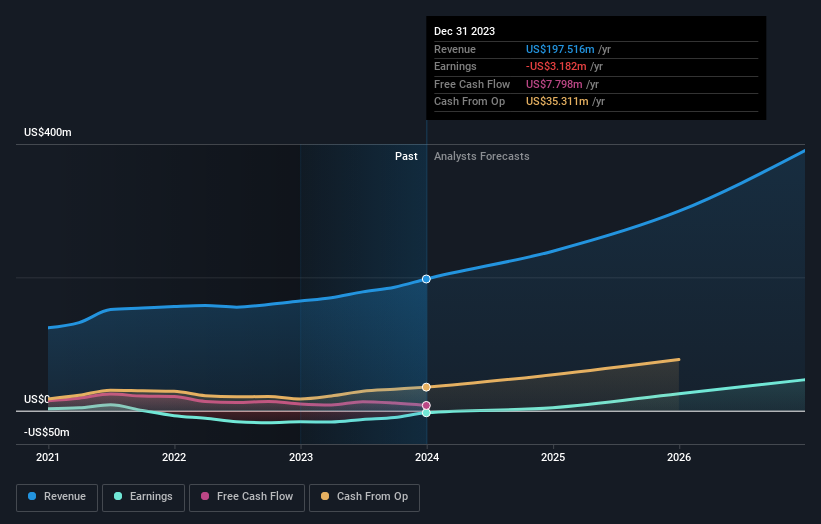US$52.07 - That's What Analysts Think Vericel Corporation (NASDAQ:VCEL) Is Worth After These Results
Shareholders might have noticed that Vericel Corporation (NASDAQ:VCEL) filed its yearly result this time last week. The early response was not positive, with shares down 5.5% to US$44.71 in the past week. Revenues of US$198m arrived in line with expectations, although statutory losses per share were US$0.07, an impressive 56% smaller than what broker models predicted. The analysts typically update their forecasts at each earnings report, and we can judge from their estimates whether their view of the company has changed or if there are any new concerns to be aware of. Readers will be glad to know we've aggregated the latest statutory forecasts to see whether the analysts have changed their mind on Vericel after the latest results.
View our latest analysis for Vericel
Taking into account the latest results, the current consensus from Vericel's six analysts is for revenues of US$239.2m in 2024. This would reflect a sizeable 21% increase on its revenue over the past 12 months. Earnings are expected to improve, with Vericel forecast to report a statutory profit of US$0.082 per share. Before this earnings report, the analysts had been forecasting revenues of US$238.6m and earnings per share (EPS) of US$0.11 in 2024. So there's definitely been a decline in sentiment after the latest results, noting the large cut to new EPS forecasts.
Despite cutting their earnings forecasts,the analysts have lifted their price target 11% to US$52.07, suggesting that these impacts are not expected to weigh on the stock's value in the long term. The consensus price target is just an average of individual analyst targets, so - it could be handy to see how wide the range of underlying estimates is. The most optimistic Vericel analyst has a price target of US$54.00 per share, while the most pessimistic values it at US$47.40. Even so, with a relatively close grouping of estimates, it looks like the analysts are quite confident in their valuations, suggesting Vericel is an easy business to forecast or the the analysts are all using similar assumptions.
Taking a look at the bigger picture now, one of the ways we can understand these forecasts is to see how they compare to both past performance and industry growth estimates. It's clear from the latest estimates that Vericel's rate of growth is expected to accelerate meaningfully, with the forecast 21% annualised revenue growth to the end of 2024 noticeably faster than its historical growth of 14% p.a. over the past five years. Other similar companies in the industry (with analyst coverage) are also forecast to grow their revenue at 18% per year. Vericel is expected to grow at about the same rate as its industry, so it's not clear that we can draw any conclusions from its growth relative to competitors.
The Bottom Line
The most important thing to take away is that the analysts downgraded their earnings per share estimates, showing that there has been a clear decline in sentiment following these results. Happily, there were no real changes to revenue forecasts, with the business still expected to grow in line with the overall industry. There was also a nice increase in the price target, with the analysts clearly feeling that the intrinsic value of the business is improving.
Following on from that line of thought, we think that the long-term prospects of the business are much more relevant than next year's earnings. We have forecasts for Vericel going out to 2026, and you can see them free on our platform here.
Don't forget that there may still be risks. For instance, we've identified 1 warning sign for Vericel that you should be aware of.
Have feedback on this article? Concerned about the content? Get in touch with us directly. Alternatively, email editorial-team (at) simplywallst.com.
This article by Simply Wall St is general in nature. We provide commentary based on historical data and analyst forecasts only using an unbiased methodology and our articles are not intended to be financial advice. It does not constitute a recommendation to buy or sell any stock, and does not take account of your objectives, or your financial situation. We aim to bring you long-term focused analysis driven by fundamental data. Note that our analysis may not factor in the latest price-sensitive company announcements or qualitative material. Simply Wall St has no position in any stocks mentioned.

